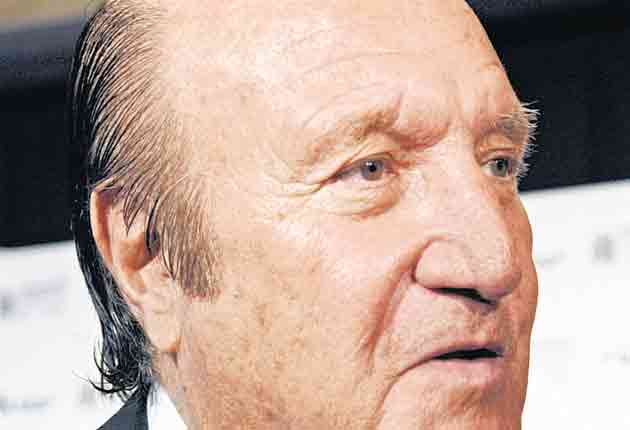Don Kirshner: Music publisher and producer behind a wealth of Sixties hits

The music publisher Don Kirshner managed a team of New York songwriters who wrote such hit songs as "Will You Love Me Tomorrow", "Oh! Carol" and "You've Lost That Lovin' Feelin'". He was the key publisher in the early 1960s and knew how to spot talent; more than anyone else, he turned writing teenage songs into a profession.
Don Kirshner was born in the Bronx in April 1934. He graduated from college in business administration and learned about organisation through his captaincy of the college basketball team.
On a holiday job at a club in Long Island, he heard a younger boy playing the piano and he offered to write lyrics for his composition. Kirshner made a demonstration record for $50 and, being an excellent hustler, sold the song to a publisher in the Brill Building on Broadway.
Kirshner met Robert Cassotto, who wanted to be as big as Sinatra. They wrote jingles and songs including "Wear My Ring", which was recorded by Gene Vincent, "My First Real Love" by Connie Francis and "I Want To Spend Christmas With Elvis" by Little Lambsie Penn. Cassotto changed his name to Bobby Darin and, in 1958, won a gold disc for "Splish Splash", which Kirshner didn't write. Kirshner, however, was pleased: Darin's success demonstrated his ability to spot talent.
To ingratiate himself to music publishers in the Brill Building, Kirshner would take on menial jobs such as collecting lead sheets and taking them to record sessions, but an experienced songwriter, Doc Pomus, told him that he did not have enough talent to write hit songs and recommended that he become a publisher.
Al Nevins, who played for a successful lounge act, The Three Suns, was suffering from heart trouble and wanted a sedentary job. He started Aldon Music with Kirshner in 1650 Broadway. Nevins had the musical knowledge, while Kirshner knew about rock'n'roll and was hungry for success.
They were impressed by the teenage writing team of Neil Sedaka and Howard Greenfield. The pair told Aldon they would sign an exclusive contract if Aldon could place a song with a major artist within three months. Connie Francis recorded their song "Stupid Cupid", which made the US Top 20 and topped the UK charts.
Nevins secured a performing contract for Sedaka with RCA, with himself and Kirshner as producers. When Kirshner told Sedaka and Greenfield to write something like The Diamonds' "Little Darlin'", they wrote "Oh! Carol" and Sedaka developed into a major recording artist.
The husband-and-wife team Carole King and Gerry Goffin wrote for Aldon, and in 1960 they wrote the US No 1 "Will You Love Me Tomorrow" for The Shirelles.
The rise in New York girl groups (The Shirelles, The Chiffons, The Cookies) in the early Sixties was largely due to the strength of Aldon's songs. Unlike the nonsensical lyrics of many rock'n'roll songs, they often explored the dilemmas in teenage relationships. The vulnerability exposed in Bobby Vee's hits "Take Good Care of My Baby" and "Run to Him", or Steve Lawrence's "Go Away Little Girl" was true to life.
Kirshner encouraged the young singers who were making the demonstration records. Tony Orlando was given Goffin and King's "Halfway to Paradise" and also "Bless You", a song by another young couple who wrote for Aldon, Barry Mann and Cynthia Weil. Little Eva scored with Goffin and King's dance song "The Loco-Motion". It was followed by Carole King's own hit record, "It Might As Well Rain until September".
By 1962, Kirshner had 18 writers working for him, from home or in cubicles in his office. He liked setting assignments – "Today I want a song for The Shirelles" – and he had impressive results.
Kirshner enjoyed mixing his writers. Greenfield and Jack Keller wrote a US No 1 for Connie Francis, "Everybody's Somebody's Fool" (1960), while Greenfield teamed with Carole King on "Crying in the Rain" (1962) for the Everly Brothers. Mann and Goffin wrote "Who Put the Bomp (in the Bomp, Bomp, Bomp)", a 1961 hit for Mann himself.
In 1963, Nevins and Kirshner sold out to Screen Gems, a subsidiary of Columbia Pictures, for $2m. The sale was good timing as the British invasion meant that beat groups were writing their own material. In 1964, Mann and Weil wrote "You've Lost That Lovin' Feelin'" with Phil Spector for The Righteous Brothers, but mostly Screen Gems songwriters were writing for lightweight TV series.
Nevins died in 1965, shortly before Kirshner was asked to supply the music for a TV series about a manufactured band, The Monkees. Their Screen Gems hits included "I'm a Believer" and "Daydream Believer". To speed production, the band did not play their own instruments at first. When Michael Nesmith complained, Kirshner said, "Why don't you just shut up and cash the cheques?"
Kirshner jokingly said that he wanted "a band that wouldn't talk back"; he found one with the cartoon series The Archies. "Sugar Sugar" (1969), performed by session musicians, was an international hit.
In the 1970s, Kirshner was a wooden host for the series Don Kirshner's Rock Concert, which featured The Rolling Stones, David Bowie and Kiss. He retired in the mid-1980s.
Spencer Leigh
Donald Kirshner, music publisher: born New York 17 April 1924; married (one son, one daughter); died Boca Raton, Florida 17 January 2011.
Subscribe to Independent Premium to bookmark this article
Want to bookmark your favourite articles and stories to read or reference later? Start your Independent Premium subscription today.

Join our commenting forum
Join thought-provoking conversations, follow other Independent readers and see their replies